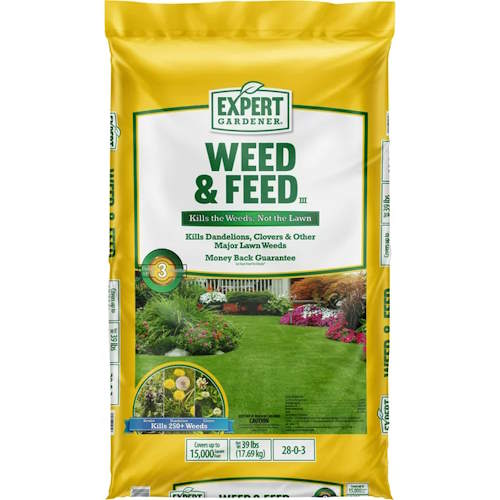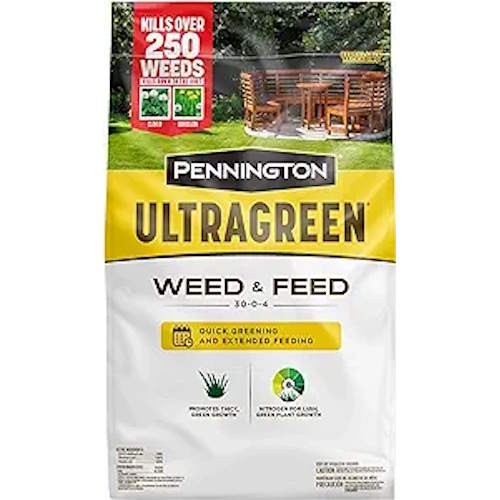The best time to put down weed and feed to help you have lush grass for summer
Tips from turf care experts to help you use weed and feed products at the ideal time for the health of your lawn
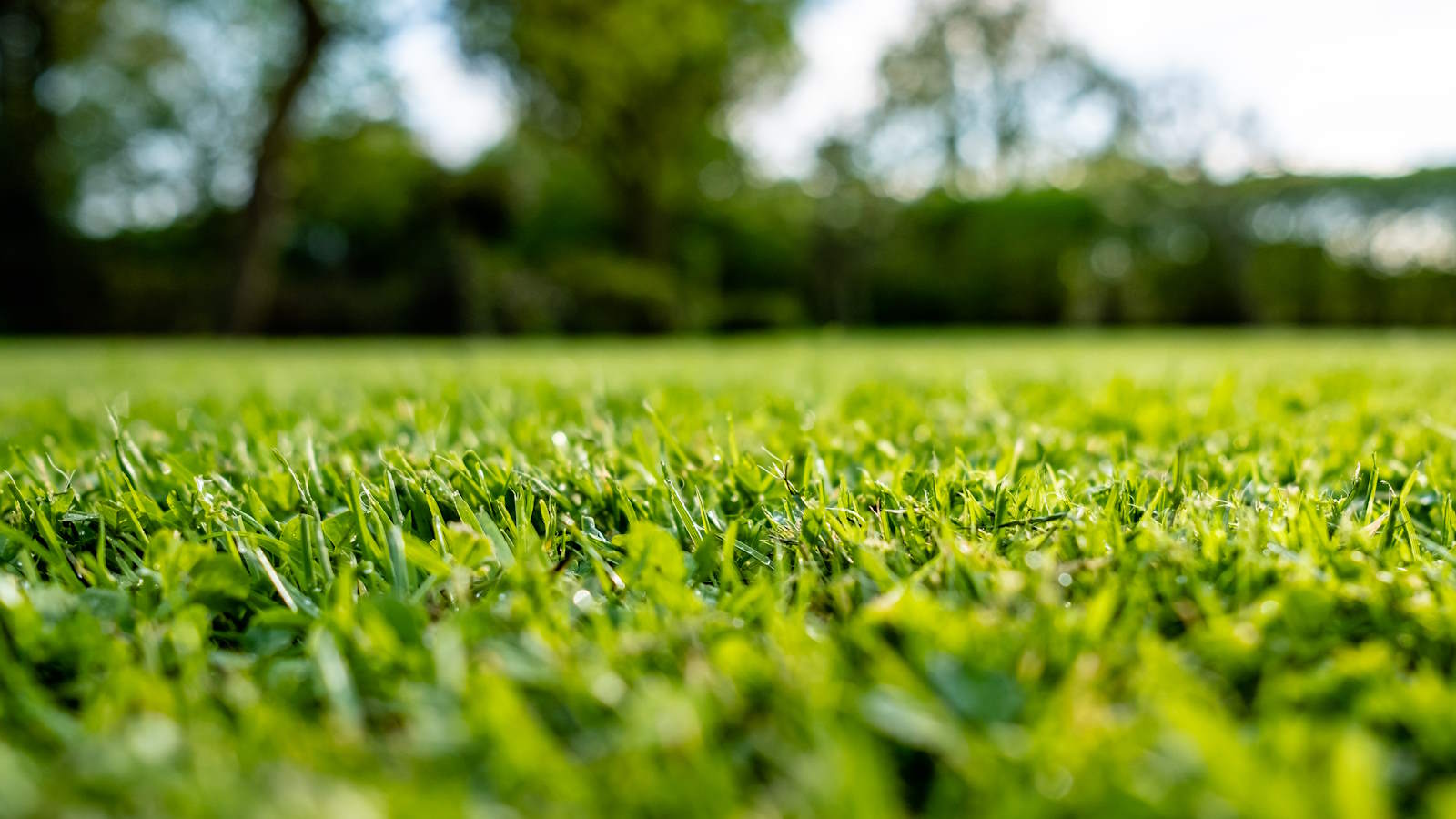

Caring for a lawn can require a lot of care and attention, which is why people often turn to weed and feed products. They offer a double combo of benefits to gardeners who use them annually to help keep their lawns lush and weed-free.
Fertilizing a lawn and combatting weeds are essential parts of any good lawn care regime, along with mowing, aerating, and dethatching. But that all takes time and planning, so it is understandable why products that can do two jobs are beneficial.
Weed and feed products are useful, but they do need to be applied properly and at the right time. Otherwise, they can do more harm than good to your lawn. To help you get it right and maintain a healthy lawn, we look at the right time and how often to use them.
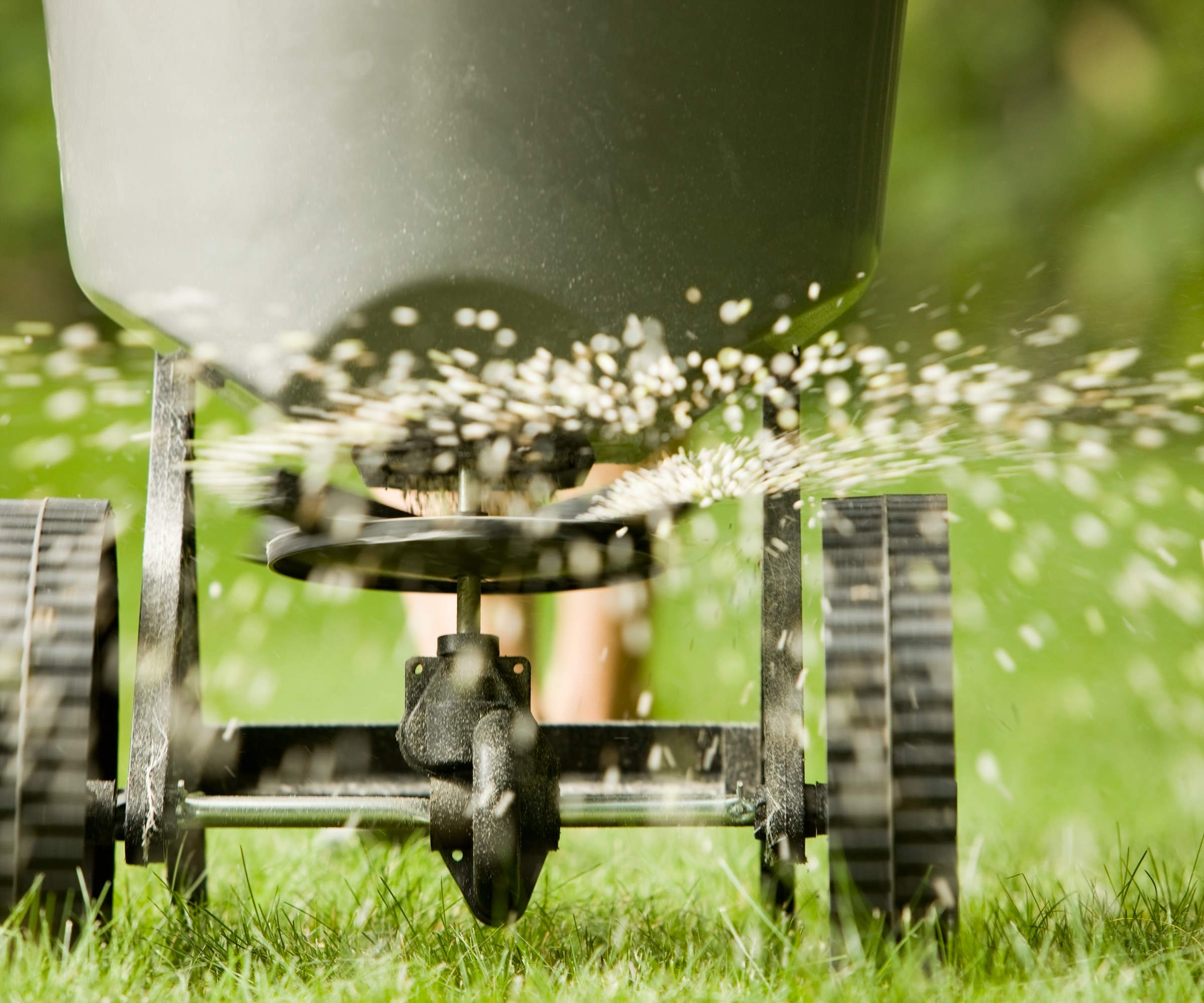
Most weed and feed products are granular and best applied with a spreader
What are weed and feed products?
The term ‘weed and feed’ covers many products that carry out multiple beneficial tasks to anyone wanting to make their lawn green, thick and weed-free.
Such products contain post-emergent broadleaf herbicides to kill weeds and prevent them from taking hold in your lawn. They can be used to get rid of dandelions, clover, and many other weeds as they kill weeds but not grass.
The products also contain fertilizer to provide valuable nutrients to the lawn. Some weed and feed can also contain moss killer and pre-emergent herbicides to stop new weed seeds from sprouting.
What is the best time to put down weed and feed?

Weed and feed products can help you have a green and weed-free lawn
Getting the timing right is crucial when using weed and feed products as part of your lawn care regime. To be at its most effective in eliminating weeds and feeding grass, it wants to be applied at the right time of year.
The best time to put down weed and feed is going to be as part of your spring lawn care jobs. If you are thinking of a fertilizer for grass in spring, weed and feed is beneficial as, at this time of year, the weeds are starting to grow and the lawn is awaking from its winter slumber and in need of nutrients.
‘You can technically use weed and feed all year round but for optimal results you’ll want to use it in early springtime,’ says Chrissie Handley, a lawn care specialist working for Online Turf. ‘This is usually when you’re looking to start work on a new garden project or give your pre-existing lawn a fertilising boost ready for the growing season ahead. I’d recommend using it between March-May when the temperatures start to rise.’
Using the product in spring means you target the weeds that grow in the summer and can become blemishes on your pristine lawn. It is ineffective to use weed and feed in summer. The weeds will be too established and the grass can already be under stress due to heat. Adding feed to a stressed lawn increases the risk of fertilizer burn and yellow patches in the grass.

Chrissie Handley is Lawn Care Specialist providing tailored advice on laying, maintenance and general lawn care for Online Turf.
The best time to put weed and feed down in spring
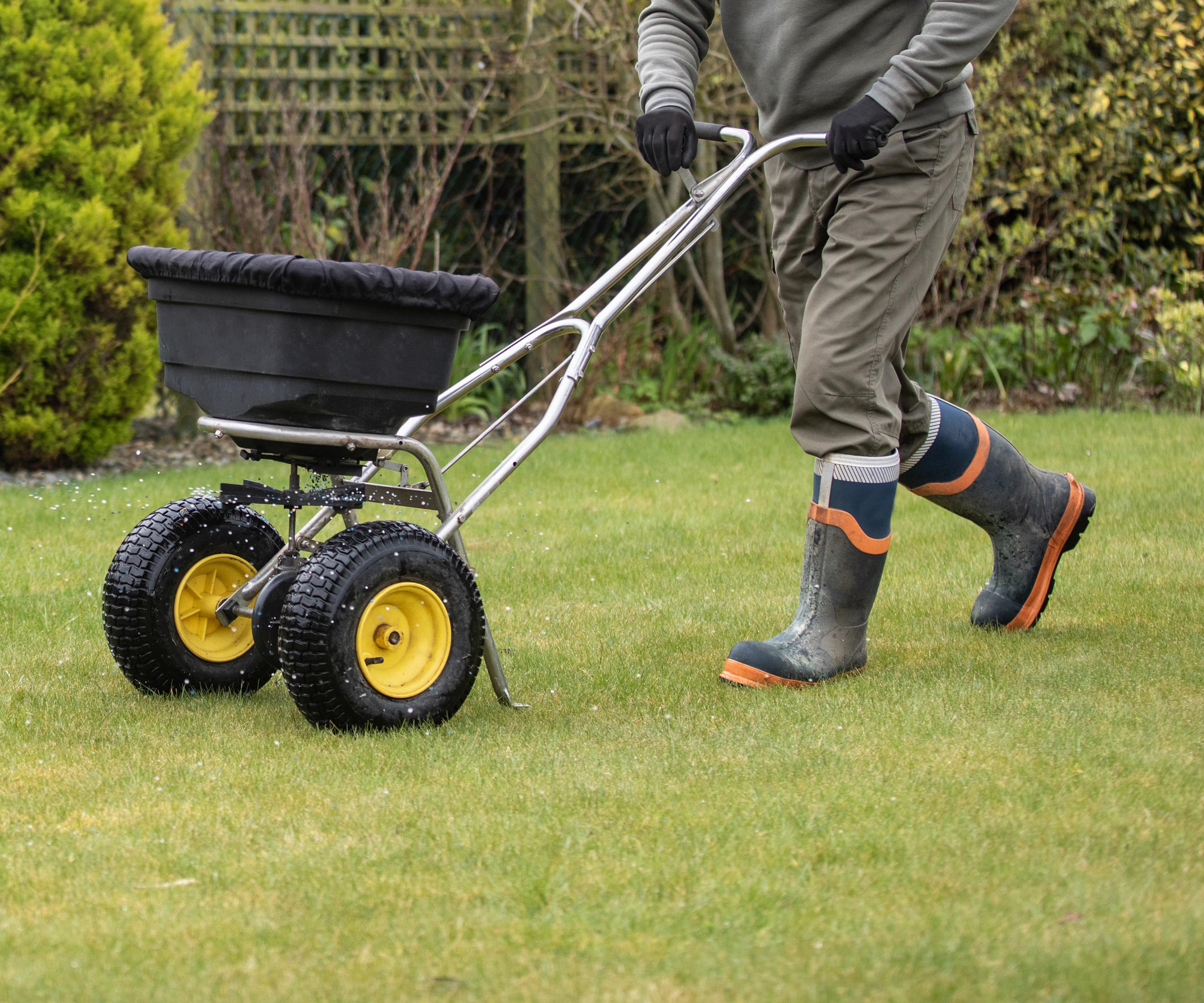
Only ever apply weed and feed products to a lawn at the recommended rate
As most weed and feed products feature post-emergent herbicides, they should be applied only once the weeds start appearing in mid-spring.
The exact time they start to grow will depend on your climate and US hardiness zone, but you want to fertilize your lawn in spring with such products between March and May, or even into early June in colder climates.
Applying the fertilizer to a lawn too early means the weeds will not have started growing and can merely spring up after the application. There is also little point in attempting to use weed and feed early in winter as the lawn will be dormant and the product will not have any effect on frozen soil.
The weather also plays a part in getting the timing right as, for example, there are ideal temperatures for applying weed and feed. As Dan Bailey, president of WikiLawn Austin, says: ‘You want to use it when the outside temperature is between 60 and 90F.’
Keep an eye on the local weather predictions and refrain from fertilizing if heavy rain is predicted. While you can fertilize in the rain and it offers benefits as it helps the soil absorb the products, heavy storms afterwards can potentially dilute the herbicide and render it less effective.
It pays to pick the right moment, even down to the best time of day, to ensure your weed and feed is the most effective.
‘When using in the springtime, the best time of day would be in the morning or evening,’ recommends Chrissie Handley. ‘If applied when the sun is directly overhead, the high temperatures can sometimes scorch the product into the lawn, damaging the blades.’
Shop weed and feed products
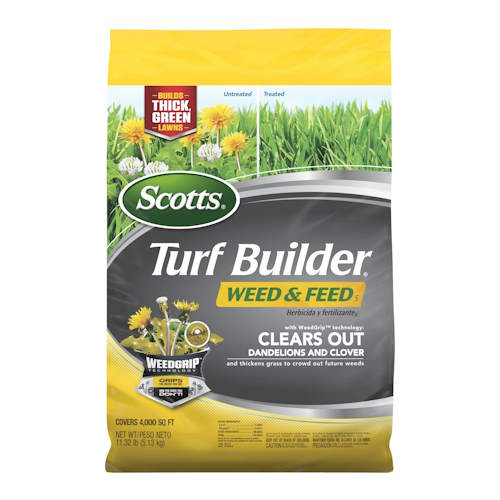
A weed killer plus fertilizer that kills existing weeds and feeds to thicken your lawn and crowd out future weeds. Controls over 50 listed lawn weeds, including clover, dandelion, plantain, morning glory, chicory, evening primrose, and purslane.
How often can you use weed and feed each year?

Weed and feed products should not be over-applied each year
To avoid over-fertilizing a lawn, there are recommended limits to how often you should spread weed and feed on your grass annually. The products contain a high level of chemicals and nutrients, and using too much can affect the balance of nutrients in the soil. Experts recommend that weed and feed should not be used more than twice in one year.
‘If the spring application doesn’t remove all the weeds, and you think it needs another application, wait until fall to apply a second dose,’ says Jeremy Yamaguchi, CEO of Lawn Love. ‘Your grass will need plenty of time to recover from the first application, so never apply it more than twice a year.
‘There should be at least two months between the first and second application to keep the chemicals from building up to dangerous levels in the soil and threatening to kill off all vegetation in your yard.‘
Using weed and feed products too often can affect the health of your lawn, causing a lot of damage and even risking killing the grass completely.

As the CEO of Lawn Love, Jeremy Yamaguchi helps homeowners find quality, reliable lawn care. Specializing in technology and using industry experience, he intends to revolutionize the lawn care industry.
FAQs
Can I weed and feed my lawn in February?
If your grass starts actively growing in February, and the risk of frozen ground has passed, you can use weed and feed products on the lawn during the month.
Can you put down fertilizer after weed and feed?
As weed and feed products contain fertilizer, it is recommended to wait until fall to fertilize the lawn again.
Do you use weed and feed before or after mowing?
You can mow the lawn before applying weed and feed but do not take out the lawn mower and cut the grass for at least four days after using the product.
If you intend to overseed a lawn in spring and plant grass seed, you can fertilize it before seeding in spring by using a dedicated starter fertilizer. Such a product is designed for use when sowing seed and one example is Scotts Turf Builder Starter Food, available at Amazon. Using a product not intended to be used alongside seeding can prevent the grass seed from germinating, so always read the packaging when choosing a product to use in spring.
Sign up to the Homes & Gardens newsletter
Design expertise in your inbox – from inspiring decorating ideas and beautiful celebrity homes to practical gardening advice and shopping round-ups.

Drew’s passion for gardening started with growing vegetables and salad in raised beds in a small urban terrace garden. He has worked as a professional gardener in historic gardens and specialises in growing vegetables, fruit, herbs, and cut flowers as a kitchen gardener. That passion for growing extends to being an allotmenteer, garden blogger, and producing how-to gardening guides for websites. Drew was shortlisted for the New Talent of the Year award at the 2023 Garden Media Guild Awards.
-
 7 habits every good plant parent has, according to houseplant experts – number 3 will surprise you most
7 habits every good plant parent has, according to houseplant experts – number 3 will surprise you mostWatch your houseplants thrive after you build these tasks into your routine
By Tenielle Jordison
-
 What the unexpected fashion trick the 'Sandwich Method' taught me about decorating with color in my home
What the unexpected fashion trick the 'Sandwich Method' taught me about decorating with color in my homeI took a cue from my wardrobe and matched my ceiling to my skirtings – here's why it's my new favorite color trick
By Charlotte Olby
